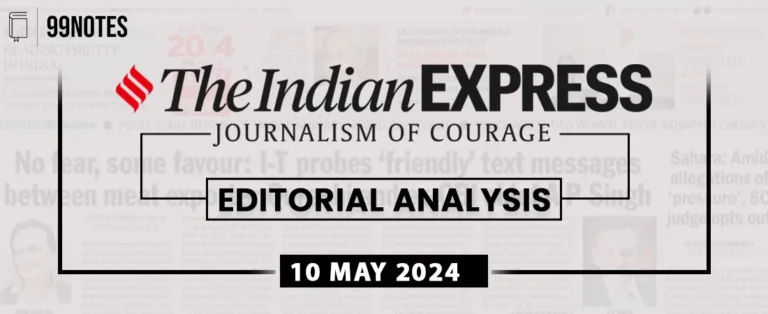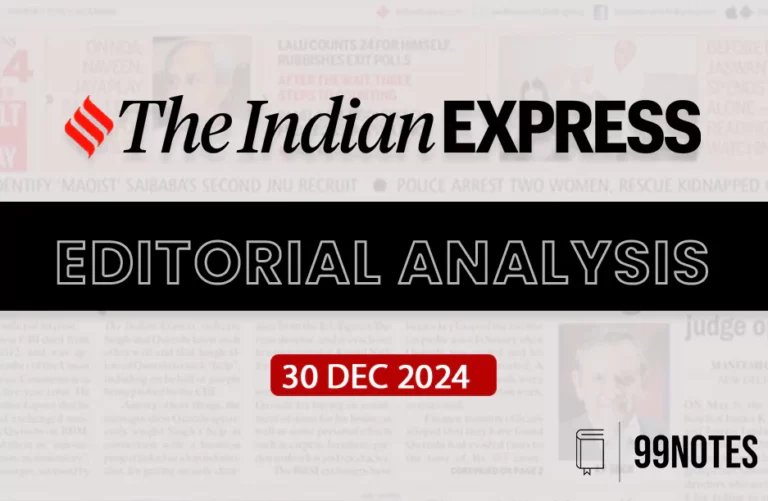21 Dec 2023 : Indian Express
Indian Express
21- December-2023
1. A moral failure
| Topic: GS2 – Polity- Parliament Functioning This topic is not much relevant in the context of Prelims but more for Mains in the context of functioning of Parliament |
| Context: |
|
Deeper Political Crisis:
- Submerged behind the apparent dynamics of government versus opposition is a more profound political crisis that seriously jeopardises democratic norms and constitutional precepts.
- This crisis has four distinct components:
1. Legislative Discourse Decline:
- Because Members of Parliament frequently follow coalition or party lines legislative deliberations have lost political relevance.
- Parliamentary discussions are becoming a collection of irrelevant speeches, interruptions, and sloganeering rather than a platform for good debates and mutual learning.
- Parliament’s democratic capacity is weakened by the absence of significant contributions.
2. Professionalisation of Politics
- Indian politics adopted the national movement’s emphasis on social service after independence.
- Nonetheless, political rivalry forced politicians to exploit elements of regional identity, caste, and religion for their own political advantage.
- Politicians now embrace language that guarantees more attention, even if it goes against past moral principles, as a means of obtaining power and advancing in their career.
3. Intellectual Bankruptcy
- Political parties create electoral packages to entice voters in the political marketplace, seeing themselves as rival companies.
- Parties in a post-ideological world are hesitant to question prevailing narratives, which adds to the political class’s intellectual bankruptcy.
- Discussions over legislation worsen, and interruptions and suspensions start to happen frequently.
4. Decline of Political Morality
- It is expected of legislators to respect political morality and act as a group.
- On the other hand, given that parliamentary procedures are being cited without considering broader democratic values, recent occurrences suggest a major erosion in political morality.
- Rules imposed without respect to the ideals of the constitution are considered politically incorrect and illogical.
Way Forward:
- Surveys show that, in spite of these difficulties, the general Indian population still views Parliament as one of the most trustworthy public institutions.
- Voters’ active involvement in the election confirms the perception that the public expects Parliament to uphold and defend democratic norms.
- The political elite must take this public opinion seriously in order to stop the continued deterioration of democratic institutions.
| PYQ: Individual Parliamentarian’s role as the national lawmaker is on a decline, which in turn, has adversely impacted the quality of debates and their outcome. Discuss. (UPSC CSE (M) GS-2 2019) (250 words/15 m) |
| Practice Question: Discuss the challenges faced by the Indian parliamentary system. How can these challenges be addressed to strengthen democratic values in the country? (250 words/15 m) |
2. Beyond App & Coaching Class
| Topic: GS2 – Social Justice-Education This topic is not much relevant in the context of Prelims but more for Mains in the context of challenges in India’s education sector. |
| Context: |
|
The Crisis in the Education Sector:
- The article declares that the education industry is in a crisis and links it to irresponsible politicisation and commercialization.
- The article argues that in order to protect the sector from limited political concerns, restoring it will need a planned, methodical strategy and national agreement.
Limitations of Technology in Education:
- The article draws attention to the drawbacks of edutech startups, especially their inability to provide results without the help of qualified educators.
- The article promotes wise educational investments while cautioning against market-driven technological fundamentalism.
Rise of the Tuition Industry:
- Concerns are raised by the tuition industry’s explosive growth, which is estimated to be worth over Rs 58 billion and double by 2028.
- The article notes that the devaluation of high school exams by government policies has led to the emergence of tuition centres.
- It bemoans the trend of parents gravitating towards tuition centres and sees them as a danger to traditional education.
Quality of Teaching and the Widening Divide:
- The article addresses the inadequate quality of instruction in various school settings, highlighting the growing divide between pupils with higher levels of education and those with lower levels.
- It draws attention to the annual rise in students battling an inadequate system and exposes the government’s preference for material tweaks over creative fixes.
Solutions for Reform
- The article advocates for societal involvement in education reform beyond government action and offers ideas for reform.
- Among the ideas include encouraging volunteerism, civil society, and engaging senior citizens.
- Proposed initiatives include greater accountability for teachers and conditional pay doles for women based on their children’s academic success.
Conclusion:
- The article’s conclusion emphasises how critical it is that political priorities for education be set, both in terms of funding and attention.
- It calls for a commitment to raise the budget to at least 6% of GDP, as suggested by the Education 2030 Framework for Action, and criticises India’s insufficient spending on education.
- The article provides a thorough summary of the issues facing India’s education system, emphasising the necessity of a coordinated and dedicated effort from all parties involved in order to bring about significant reform and progress.
| What are the Features of National Education Policy 2020? |
|
| PYQ: Discuss the main objectives of Population Education and point out the measures to achieve them in India in detail. (UPSC CSE (M) GS-2 2021) (150 words/10 m) |
| Practice Question: Analyze the challenges in India’s education sector. (150 words/10 m) |
For Enquiry

21 Dec 2023 : Indian Express

21 December 2023 : The Hindu Editorial Notes PDF

21 Dec 2023 : PIB

21 Dec 2023 : Daily Current Affairs

20 Dec 2023 : Daily Quiz

20 Dec 2023 : Daily Answer Writing

20 Dec 2023 : Indian Express

20 December 2023 : The Hindu Editorial Notes PDF

20 Dec 2023 : Daily Current Affairs

20 Dec 2023 : PIB
december 2023 indian express 21 Dec 2023 : Indian Express Indian Express
21- December-2023
1. A moral failure
Topic: GS2 – Polity- Parliament Functioning
This…
December 2023 The Hindu 21 December 2023 : The Hindu Editorial Notes PDF The Hindu Editorial
21-December-2023
1. A security breach that must lead to sweeping changes.
Topic:…
December 2023 Pib 21 Dec 2023 : PIB PRESS INFORMATION BUREAU
21-December -2023
1. Government has initiated steps to increase the nuclear…
Daily Current Affairs 21 Dec 2023 : Daily Current Affairs Daily Current Affairs
21-December-2023
1. India’s K-Shaped Recovery: Surprising GDP Growth Masks…
Daily Quiz 20 Dec 2023 : Daily Quiz 20 Dec 2023 : Daily Quiz…
mains answer writing 20 Dec 2023 : Daily Answer Writing Mains Answer Writing
20-December-2023
Q1) What do you understand by footloose industries? Discuss their…
december 2023 indian express 20 Dec 2023 : Indian Express Indian Express
20- December-2023
1. NEW LESSONS, NEW QUESTIONS
Topic: GS2 – Education
This topic…
December 2023 The Hindu 20 December 2023 : The Hindu Editorial Notes PDF The Hindu Editorial
20-December-2023
1. The deep import of the Article 370 verdict.
Topic: GS2 – Indian…
Daily Current Affairs 20 Dec 2023 : Daily Current Affairs Daily Current Affairs
20-December-2023
1. Karnataka to reduce burden of school bags by 50%.
Topic:…
December 2023 Pib 20 Dec 2023 : PIB PRESS INFORMATION BUREAU
20-December -2023
1. Soil Health Management and Soil Health Card Schemes
Topic:…




